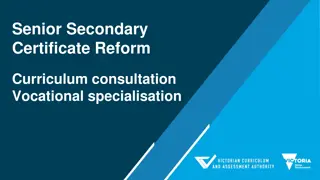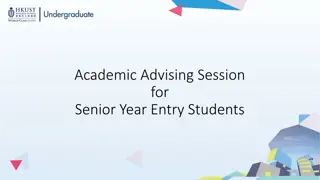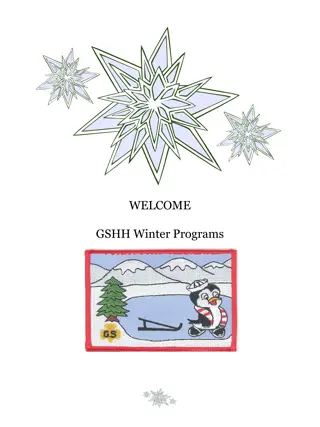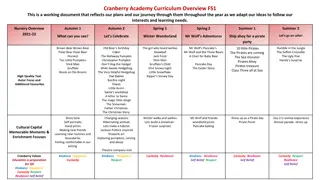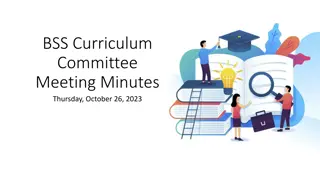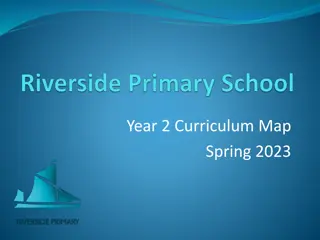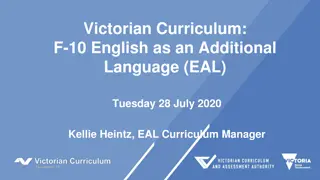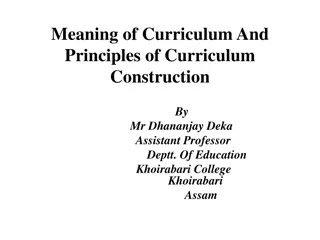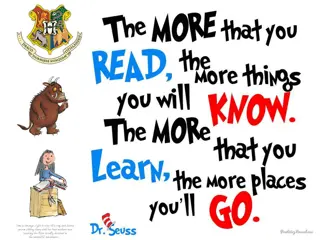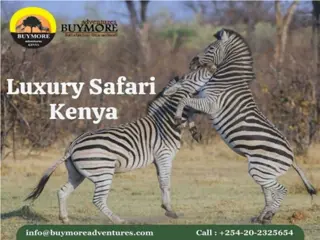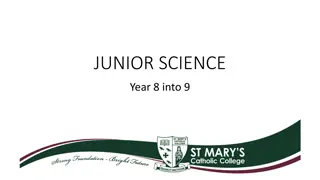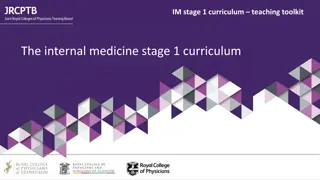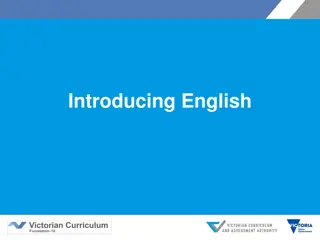Exciting Learning Adventures in Billingham & Teeside Year 1 Curriculum
Dive into a fun-filled academic journey in Billingham & Teeside Year 1 curriculum, exploring geography, history, science, computing, art, music, and physical education. From identifying local landmarks to learning about common animals, simple mechanisms, and music dynamics, this curriculum offers a diverse and engaging educational experience for young learners.
Download Presentation

Please find below an Image/Link to download the presentation.
The content on the website is provided AS IS for your information and personal use only. It may not be sold, licensed, or shared on other websites without obtaining consent from the author. Download presentation by click this link. If you encounter any issues during the download, it is possible that the publisher has removed the file from their server.
E N D
Presentation Transcript
Who wants to go on a road trip? Billingham & Teeside Year 1
Geography In Geography, the children will study our local area. They will begin with identifying the four countries within the UK and their capital cities before identifying Billingham on a map. The children will go on a walk around Billingham, visiting key landmarks such as the Forum, the library and the train station. Once familiar with their surrounding environment, the children will identify landmarks and basic human and physical features in aerial photos and plan perspectives of the Teeside area. The Teeside Landmarks that the children will study will be the Transporter Bridge, Roseberry Topping, MFC, Saltburn Cliff Lift, The Millennium Bridge and The Trincomalee. During this topic the children will also learn to use basic symbols with a given key to design their own map. The child will describe a journey to the library using simple locational and directional language (left, right, forwards and backwards). History In history this half term, the children will learn about the opening of the Forum. They will plan some questions to ask a member of the local community about what life was like in Billingham in the past. https://www.bbc.co.uk/bitesize/subjects/zcdqxnb
Science In Science, the children will learn to identify and name common animals that are found within our local area. e.g. frog, fish, blackbird, seagull, hedgehog, squirrel. They will learn to understand that common animals do not all have the same structures and they will learn to name and label these features e.g. eyes, ears, legs, wings, fins, tail, claws, fur, beak, horns, mane. The children will also learn about seasonal changes that occur in winter. https://www.bbc.co.uk/bitesize/topics/z6882hv DT Computing In DT, the children will learn about the movement of simple mechanisms such as lever, sliders, wheels and axels. The children will apply these skills to make a moving picture book. In computing, children will begin to learn about programming. They will create and debug simple programmes and use logical reasoning to predict the behaviour of simple programmes. The children will learn and begin to understand what algorithms are and how these are implemented as programmes on digital devices.
Art This half term the children will look at and talk about paintings by Van Gogh and the techniques used expressing their likes and dislikes. Children will learn to use 2 grades of pencils and pastels to draw lines of different shapes and thickness and explore these to create moods in their drawings. They will also create a variety of patterns using lines e.g. straight, twisty, thick, thin, wavy and they will use lines to draw from their imaginations to communicate something about themselves. Music Charanga Unit 3 How Does Music Make the World a Better Place? In this unit, children are introduced to Tempo and Dynamics. In thinking about these two new elements children are able to add even more variety to the music performed or created, and build their vocabulary of words that can describe the music they hear. We talk about these words together as a class and begin to embed them with the children when listening, creating and performing.
Physical Education This half term in PE the children will develop their ball skills by learning to cup their hands together in order to catch a non-rolling object. They will then move onto developing their throwing skills by throwing an object into a target space, with accuracy. The children will also build upon their rolling and kicking skills from the Foundation stage so they are able to roll/kick a large ball with control. They will also explore how to bounce and catch a large ball from a static position. The children will then play basic games to give them the opportunity to apply their new skills. Religious Education The children will learn about Islam this half term. They will learn how Muslim s show belonging by looking at a range of Islamic artefacts and their meanings. They will learn about the mosque being their place of worship and what you will find there. The children will also learn about the Prophet Muhammed. They will learn about why he was a good leader for Muslims and how the features of a mosque help Muslim s connect to their God.
Relationships and Health Education This half term the children will be looking at different types relationships. They will be identifying who the special people they have in their lives are and talk about the importance of families. They will discuss who to go to if they are worried and how to attract their attention. They will take part in discussions about what make them and others special. They will learn the qualities of a good friend and find strategies to work out arguments and disagreements without being unkind. This will require the children to use skills such as listening to others and working as part of a team. British Values Rights Respecting Focus Article 14: You have the right to choose your own religion and beliefs. Your parents should help you decide what is right and wrong, and what is best for you. Article 22: You have the right to special protection and help if you are a refugee (if you have been forced to leave your home and live in another country), as well as all the rights in this Convention. Article 24: You have the right to the best health care possible, safe water to drink, nutritious food, a clean and safe environment, and information to help you stay well. Article 29: Your education should help you use and develop your talents and abilities. It should also help you learn to live peacefully, protect the environment and respect other people. Article 30: You have the right to practice your own culture, language and religion - or any you choose. Minority and indigenous groups need special protection of this right. Tolerance of Culture and other Faiths The children will learn to respect other people and recognise that people may be different from us. We will promote equality and fairness. The children will also learn that we are all different, special and have a range of skills to offer. Global Goal
Reading Bespoke book focus Reading regularly at school and at home is essential to children s language development: it increases their vocabulary and develops their understanding of age-related texts. In school, children will have daily phonics lessons, weekly VIPERS/comprehension lessons and will use a range of texts as a focus for English lessons. As a result, they will be exposed to a range of texts across a range of genres. The Snowman By Raymond Briggs Home Reading Phonics Read Write Inc Whilst they will be regularly listened to read in school, children will also benefit further by practising their reading at home. Children should try to read 3 times a week at home and this should be recorded in their reading diary. Reading diaries will be checked weekly and should be in school every day. We follow the programme of Read Write Inc. Ruth Miskin where phonemes and graphemes are grouped together into sets. All pupils receive discrete daily phonics lesson which follows the Introduce, Review, Teach, Practise and Apply model. They are provided opportunities for daily oral and written practice to increase phonic knowledge and develop letter formation and joins.
https://www.youtube.c om/watch?v=5A3THigh ARU Writing Children will begin to learn the basic features of instructions and stories. Linked to our science work on seasonal change the children will write instructions on how to build a snowman, and then following this they will write a story based on The Snowman . Spelling As part of their homework, children will receive two spellings from the common exception word list. In addition to this, children will learn to spell words with the suffixes -ed, -ing, -er & -est. Please practise these spellings with your child using the say cover, write, check grid.
Maths This term Children continue to following White Rose Maths. This scheme of work helps children develop their conceptual understanding of mathematics by using concrete objects, pictorial representations and abstract thinking. This inclusive approach is based on the principles of cognitive psychology and child development. Within this half term, children will be focussing on place value of numbers to 20, addition and subtraction within 20 and will begin to look at numbers to 50. Children will be taught to: Count to 20. Understand numbers 10-20 Understand the concept of a number line Compare and order numbers up to 20 Calculate one more and one less than a stated numbers up to 20 Add and subtract numbers (within 20) using concrete objects, pictorial representations, and mentally, Please continue to help your child practise the following: Doubles and halves to 10 Number bonds to 10 Counting in 2s Counting in 5s Counting in 10s https://whiterosemat hs.com/advice-and- guidance
Homework Maths homework will be given via Seesaw this half term. It will be available online each Friday and should be completed by the following Wednesday. Spellings will continue to be sent home in the children s green homework books as usual. PE Kits Key Dates Please assist your child in taking responsibility for remembering to bring their PE kit into school at the start of every new term. PE lessons usually take place on Tuesday s. 1/02/2024 Y1 walk around Billingham Trip Reading Diaries Reading diaries should be in school every day. Please try to hear your child read at least three times a week and discuss key themes, events and characters. Please comment on your child s reading in the Home School Book.
Roseberry Avatars At Roseberry we aim to be the best we can be and we use our Avatars to teach the children about how we can do this! Here are our Avatars and the children can find them in their classrooms. Eagar Ethos Teamwork Tango Pop Pop Passion Steely Resilience Annie and Arnie Arty Creative
Useful Information Apps/websites that children regularly access in class: Oxford Owl Login details: 1R 1P 1rroseberry 1proseberry R0seberry1R R0seberry1P Seesaw Log in details are in your child s green Homework book. Topmarks https://www.topmarks.co.uk These can also be accessed at home to help with your child s learning.
If you require any further support, please speak to your childs class teacher. Alternatively, the Y1 email address (RJYear1@roseberryprimary.org.uk) can also be used to support with teacher-parent communication. We would like to thank parents and carers for their on-going support. The Y1 Team








